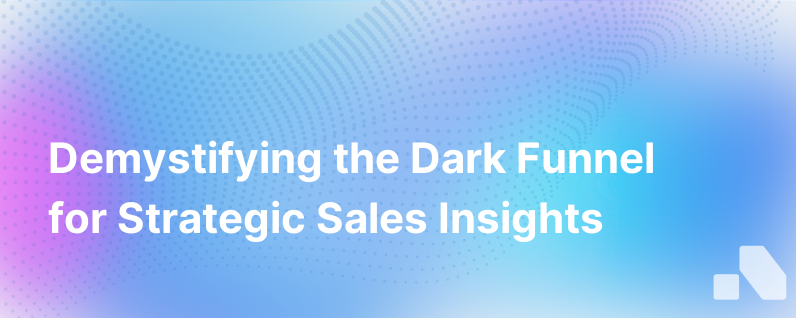
In today's world of B2B marketing, the 'dark funnel' is a term that has started to capture a lot of attention. It signifies the areas of online customer journeys that are invisible to traditional tracking methods, usually due to privacy settings or the use of multiple devices and channels. For marketers accustomed to data-driven strategies, the dark funnel can be a source of frustration, leaving significant customer behavior unaccounted for and potential insights untapped. However, as anonymous becomes the new norm, there are sophisticated methodologies emerging to demystify this dark funnel and turn anonymity into identifiable data.
In this guide, we will delve into the dark funnel, explore the challenges it poses to marketers, and discuss strategies that can help B2B companies identify prospects more effectively—even where traditional tracking fails.
The Dark Funnel Unveiled
What is the Dark Funnel?
The dark funnel represents all the anonymous interactions potential buyers have with your brand before they become visible in your marketing tracking systems. This includes ungated content interactions, word-of-mouth referrals, social media engagements, forum discussions, and any other untrackable touchpoint where potential buyers learn about your products or services without directly revealing their identities or intents.
Why is it Important?
Ignoring the dark funnel can be likened to navigating with an incomplete map; you'll miss out on understanding a crucial part of the buyer's journey. Recognizing and engaging the activities within the dark funnel is vital for:
- Accurate Attribution: Understanding what truly influences conversions and spending marketing budget wisely.
- Comprehensive Buyer Profiles: Piecing together a more complete view of your potential customers.
- Enhanced Content Strategy: Tailoring content to actual points of interest and engagement that might be hidden.
Overcoming the Anonymity Barrier
Identifiable vs. Anonymous Data
The crux of demystifying the dark funnel lies in the distinction between identifiable and anonymous data. Identifiable data is what marketers traditionally use: email addresses, names, IP addresses, etc. Anonymous data, on the other hand, includes untracked website visits, content interactions, and social engagements that do not readily provide contact information.
The Tools and Tactics to Illuminate the Dark
To convert this anonymous data to identifiable, marketers are adopting a mix of technology and smart strategies.
Integrate Advanced Analytics: Leveraging sophisticated analytics solutions with machine learning can provide insight into behavioral patterns and predict when an anonymous user might be a potential lead.
Use Lead Capture Strategies Subtly: Deploying techniques such as cookies, lead magnets, and gentle opt-in prompts to encourage users to willingly provide information in exchange for value.
Content Syndication Networks: By using these networks that track interactions across a wide array of sites and publications, you can start to attribute anonymous touchpoints to identifiable leads.
Reverse IP Lookup Services: These services can help companies match anonymous website traffic to company names and potential points of contact within target organizations, effectively turning website analytics into actionable sales leads.
Account-Based Marketing (ABM) Strategies: ABM focuses on targeting specific accounts rather than casting a wide net. It uses intent data, firmographic details, and predictive analytics to identify and engage with potential buyers within a specific company, thus illuminating parts of the dark funnel related to that account.
Embracing Engagement Scoring
Engagement scoring can help convert unknown interactions into well-understood data points. By assigning values to different types of anonymous interactions, marketers can weigh the significance of each and build a model that identifies engagements most likely tied to high-value prospects.
The Role of AI and Machine Learning
The use of AI and machine learning is perhaps the most potent tool in the marketer's arsenal for tackling the dark funnel. These technologies process large volumes of data to identify patterns that humans might miss. AI platforms can absorb signals from across the web, including unstructured and structured data that do not directly identify a user, and then use this information to create 'fingerprints' of user behavior that can signal purchase intent.
Case Studies and Social Listening
Understanding the conversations where your brand or related industry topics are mentioned—without your involvement—requires keen social listening and the capability to sift through case studies and online forums. This helps in identifying thought patterns, challenges, and potential areas of influence that might be affecting the dark funnel.
Integrating the Dark Funnel into Strategy
Collaborative Sales and Marketing
Sales and marketing teams need to work together to interpret the data that emerges from the dark funnel. Sales input is a crucial ingredient for tailoring the identification process, often providing the contextual information that AI algorithms require to be effective.
Continuous Learning and Adaptation
Just as the dark funnel is shrouded in mystery, so too are the methods for illuminating it prone to change. Marketers need to continually learn, adapt, and fine-tune their approaches to stay ahead.
Conclusion
Demystifying the dark funnel is less about completely eliminating anonymity and more about recognizing patterns and potential in anonymous behaviors. By employing advanced analytics, strategic lead capture, AI, and collaborative strategies, B2B marketers can shine a light on the dark funnel, revealing a wealth of actionable data that was previously obscured.
Embracing these tactics allows for a more nuanced understanding of the buyer's journey, from the shadowy edges where prospects first encounter your brand to the bright spotlight of a closed deal. As anonymous interactions become staples in the digital sales process, these methods and tools will become indispensable for marketers aiming to stay both compliant and competitive in their approach to lead generation and nurturing.